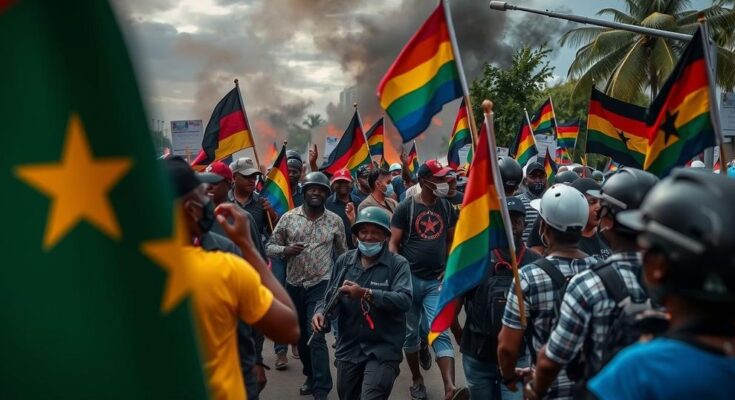Mozambique has banned protests following weeks of violence after a disputed presidential election won by Frelimo. The unrest has resulted in multiple fatalities and injuries, with the government labeling protests as terrorism. As opposition groups contest the election’s legitimacy, the situation remains volatile with heavy police and military presence in the capital, Maputo.
Mozambique’s government has imposed a ban on protests following extensive post-election violence that resulted in numerous fatalities and injuries. This unrest, triggered by last month’s controversial presidential election, saw the ruling party Frelimo declared the winner with over 71% of the votes, a result contested by opposition leaders. The Interior Minister, Pascoal Ronda, condemned the protests, deeming them acts of terrorism, and urged citizens to refrain from further demonstrations, which he characterized as threats to public safety. As security forces enforce the ban, the situation remains tense, with reports of escalating clashes between the police and demonstrators. Critics assert the elections were marred by irregularities, a claim contested by the government.
The recent unrest in Mozambique follows a disputed presidential election held last month in which the Frelimo party, in power since 1975, claims a decisive victory. Opposition parties argue that the elections were unfair and marred by manipulation, leading to significant public discontent. The protests, which erupted in the capital, Maputo, have escalated into violent clashes with law enforcement, prompting government officials to label them as subversive actions. Human rights organizations have reported a concerning death toll and have criticized the government’s measures to suppress dissent, including internet restrictions.
The situation in Mozambique remains precarious following a government ban on protests amid rising violence after the recent presidential elections. The government’s characterization of the protests as acts of terrorism reflects a broader strategy to maintain order amidst significant public unrest. As opposition parties continue to challenge the legitimacy of the election results, the need for a peaceful resolution becomes ever more pressing to avoid further escalation and loss of life.
Original Source: www.bbc.com




